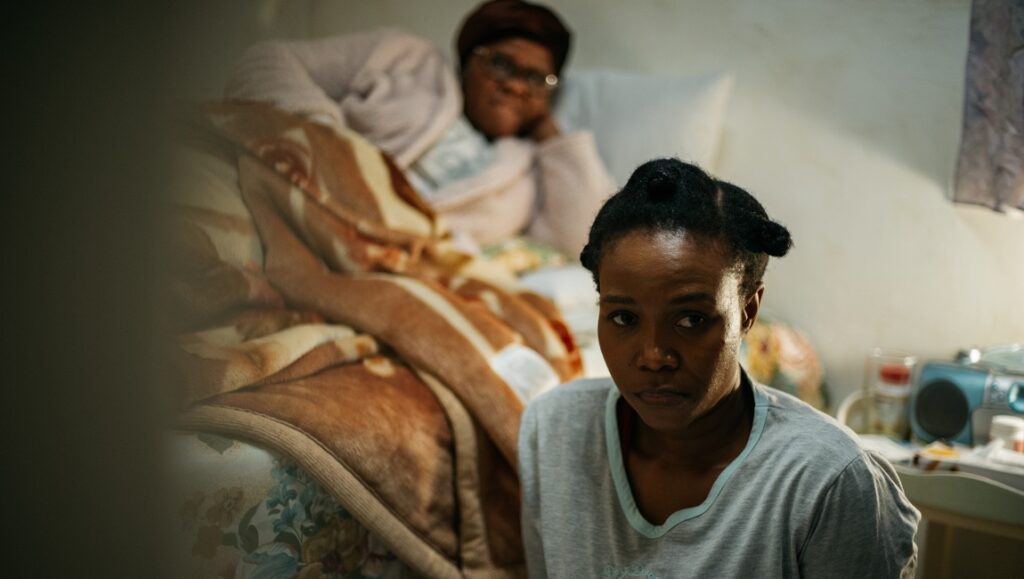Good Madam is elevated, theme-heavy horror done right, delicately refracting its discursive concerns through the lens of a haunted house tale.
The lingering consequences of the Apartheid’s atrocities continue to haunt its long-suffering victims in Good Madam, a slow-burn horror film that generates its power from the all-too-real demons that still plague the South African city of Cape Town, where this story of terror is set. Director Jenna Cato Bass uses a familiar genre framework to spin a powerful allegorical tale whose devastating effects linger long after the end credits roll. Chumisa Cosa stars as Tsidi, a 30-something mother to a pre-teen daughter who is still reeling from the recent loss of her grandmother, a strong-willed woman who raised her as her own when her own mother, Mavis (Nosipho Mtebe), chose a job as a live-in maid to an affluent white family over her own flesh and blood. Due to calamitous woe with remaining family members following the sudden death, Tsidi moves into the small room occupied by her mother in the home of the titular madam (Jennifer Boraine), who now lives alone and is bed-ridden by an unnamed illness. What follows is a portrait of familial reconciliation as captured through the lens of a classic haunted house tale, as Tsidi is soon plagued by visions of deceased dogs, severed hands coming to life, and the ghosts of past servants whose remains are buried on the property itself.
Bass establishes an atmosphere of unnerving dread from the film’s opening moments, as shots of innocuous household objects — including drain grates and light fixtures — linger for far longer than expected, hinting at the various horrors that teem within this seemingly nondescript home. It’s only upon Tsidi’s arrival that the pieces begin to fall into place and the past is brought into the cold light of the present, as Tsidi is finally given the opportunity to become acquainted with the mother she barely knows, and who seems oddly obsessed with the madam. It’s also soon revealed that Tsidi has a younger brother, to whom the madam took a liking, and who was raised as one of her own, the third son to her athletic twin boys. Jealousy mixes with anger, and before long the house seems to have its specific hold on Tsidi, who desperately tries to free her mother from the bonds that no longer chain her. One of the most remarkable things about Good Madam is the subtlety with which its themes are presented. It’s true that the film easily fits within the maligned elevated horror box, but at no point does it find the need to stop dead in its tracks to explain its various metaphors, a defect that afflicts so many American counterparts. Bass trusts that her audience members can connect the dots, and that faith proves bold in bracing ways.
But regardless of the specific contours Good Madam takes, above all it’s a committed horror film, one that understands the mechanics of the genre itself, both on a storytelling level and a technical one. Take, for instance, the choice to pair a sonorous, nauseating hum with nearly every scene of domestic placidity: it’s certainly obvious, but also effective at putting audience members on edge, awaiting the arrival of terrors that could never hope to compete with the ones its characters have already had to endure. The script itself is credited to over ten screenwriters, as Bass worked with each of her novice actors to create dialogue that seemed natural and organic to the characters themselves, individuals who have suffered firsthand the indignities presented. There’s a keen understanding that injustices are not simply obliterated by the sudden decree of a government, nor do long-standing traditions and institutions cease because of policy changes. Atrocities like Apartheid gained their power from the way they brainwashed and poisoned their victims, making them believe that they were indeed lesser and needed some benevolent guiding hand to survive. Good Madam may end with a bit of wish fulfillment, but its final shot reveals the odious power dynamics that continue to exist in a country that considers itself “enlightened,” one that is eager to forget a past that continues to haunt its victims and forever tethers them to an uncertain future.
You can stream Jenna Cato Bass’ Good Madam on Shudder beginning on July 14.


Comments are closed.